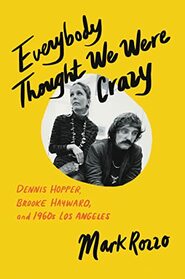Everybody Was Wrong, Everybody Was Right
Dennis Hopper projected the aura of a crazed madman and often played up on that reputation in his film roles. There was the frenzied photojournalist in âApocalypse Nowâ, the deranged bomb builder in âSpeedâ, the totally bizarre psycho in âBlue Velvetâ... just to name a few. That was really all I knew about him, other than he had bonded as a young actor with James Dean. "Everybody Thought We Were Crazy" concentrates on his life in the '60's and the relationship he had with his wife, Brooke Hayward.
The book shows that, yes, Dennis Hopper was out of control at times. It also reveals a surprisingly talented photographer and art aficionado. Often you will hear about a celebrity who paints or dabbles in some art and you wonder if this is exaggerating anything more than a hobby. Dennis created some remarkable photography and had a number of showings. He and Brooke were also early supporters of Andy Warhol and were instrumental in promoting the burgeoning Los Angeles art scene of the '60's. The private art collection presented at their house was considered an avant-garde revelation.
âEverybody Thought We Were Crazyâ is about the two of them. Brooke is the daughter of Hollywood celebrity-- her mother was superstar actress Margaret Sullavan-- and we get an account of her growing up in privileged society, hanging out with the Fondas, and her acting career, a career cut short to accommodate Dennis. Writer and friend Jill Schary referred to the couple as "the bohemian version of Liz Taylor and Richard Burton." Brooke led an interesting life and has documented it herself in her autobiography "Haywire," but her story is necessarily overshadowed here by the wild and unpredictable nature of her husband.
Dennis shared a kindred spirit in Peter Fonda until the craziness hit a peak during the production of "Easy Rider." Dennis directed what would become a symbol of counter-culture spirit and while the success of the project was a major triumph, it also found a way to tear him apart as he fought Fonda and Hollywood writer Terry Southern over whose contributions should have been recognized. The marriage to Brooke had dissolved during the filming of "Easy Rider" and Dennis tumbled into a deep void of substance abuse and psychological trauma. It took years for him to reorder his life and revitalize his career.
Dennis Hopper and Brooke Hayward led fascinating fast lane Hollywood lives. There are some great TMZ style stories throughout the book. The major take-away from Mark Rozzo's book is there is much more to these two than what we would expect. They were much more than merely art voyeurs splashing money around to earn some culture cred.
I received an advance review copy for free, and I am leaving this review voluntarily.
The man is clear in his mind, but his soul is mad. â Hopper's character in âApocalypse Nowâ
Dennis Hopper projected the aura of a crazed madman and often played up on that reputation in his film roles. There was the frenzied photojournalist in âApocalypse Nowâ, the deranged bomb builder in âSpeedâ, the totally bizarre psycho in âBlue Velvetâ... just to name a few. That was really all I knew about him, other than he had bonded as a young actor with James Dean. "Everybody Thought We Were Crazy" concentrates on his life in the '60's and the relationship he had with his wife, Brooke Hayward.
The book shows that, yes, Dennis Hopper was out of control at times. It also reveals a surprisingly talented photographer and art aficionado. Often you will hear about a celebrity who paints or dabbles in some art and you wonder if this is exaggerating anything more than a hobby. Dennis created some remarkable photography and had a number of showings. He and Brooke were also early supporters of Andy Warhol and were instrumental in promoting the burgeoning Los Angeles art scene of the '60's. The private art collection presented at their house was considered an avant-garde revelation.
âEverybody Thought We Were Crazyâ is about the two of them. Brooke is the daughter of Hollywood celebrity-- her mother was superstar actress Margaret Sullavan-- and we get an account of her growing up in privileged society, hanging out with the Fondas, and her acting career, a career cut short to accommodate Dennis. Writer and friend Jill Schary referred to the couple as "the bohemian version of Liz Taylor and Richard Burton." Brooke led an interesting life and has documented it herself in her autobiography "Haywire," but her story is necessarily overshadowed here by the wild and unpredictable nature of her husband.
Dennis shared a kindred spirit in Peter Fonda until the craziness hit a peak during the production of "Easy Rider." Dennis directed what would become a symbol of counter-culture spirit and while the success of the project was a major triumph, it also found a way to tear him apart as he fought Fonda and Hollywood writer Terry Southern over whose contributions should have been recognized. The marriage to Brooke had dissolved during the filming of "Easy Rider" and Dennis tumbled into a deep void of substance abuse and psychological trauma. It took years for him to reorder his life and revitalize his career.
Dennis Hopper and Brooke Hayward led fascinating fast lane Hollywood lives. There are some great TMZ style stories throughout the book. The major take-away from Mark Rozzo's book is there is much more to these two than what we would expect. They were much more than merely art voyeurs splashing money around to earn some culture cred.
I received an advance review copy for free, and I am leaving this review voluntarily.
The man is clear in his mind, but his soul is mad. â Hopper's character in âApocalypse Nowâ




